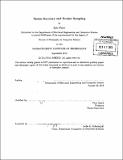Sparse recovery and Fourier sampling
Author(s)
Price, Eric C
DownloadFull printable version (13.14Mb)
Other Contributors
Massachusetts Institute of Technology. Department of Electrical Engineering and Computer Science.
Advisor
Piotr Indyk.
Terms of use
Metadata
Show full item recordAbstract
In the last decade a broad literature has arisen studying sparse recovery, the estimation of sparse vectors from low dimensional linear projections. Sparse recovery has a wide variety of applications such as streaming algorithms, image acquisition, and disease testing. A particularly important subclass of sparse recovery is the sparse Fourier transform, which considers the computation of a discrete Fourier transform when the output is sparse. Applications of the sparse Fourier transform include medical imaging, spectrum sensing, and purely computation tasks involving convolution. This thesis describes a coherent set of techniques that achieve optimal or near-optimal upper and lower bounds for a variety of sparse recovery problems. We give the following state-of-the-art algorithms for recovery of an approximately k-sparse vector in n dimensions: -- Two sparse Fourier transform algorithms, respectively taking ... time and ... samples. The latter is within log e log n of the optimal sample complexity when ... -- An algorithm for adaptive sparse recovery using ... measurements, showing that adaptivity can give substantial improvements when k is small. -- An algorithm for C-approximate sparse recovery with ... measurements, which matches our lower bound up to the log* k factor and gives the first improvement for ... In the second part of this thesis, we give lower bounds for the above problems and more.
Description
Thesis: Ph. D., Massachusetts Institute of Technology, Department of Electrical Engineering and Computer Science, 2013. Cataloged from PDF version of thesis. Includes bibliographical references (pages 155-160).
Date issued
2013Department
Massachusetts Institute of Technology. Department of Electrical Engineering and Computer SciencePublisher
Massachusetts Institute of Technology
Keywords
Electrical Engineering and Computer Science.